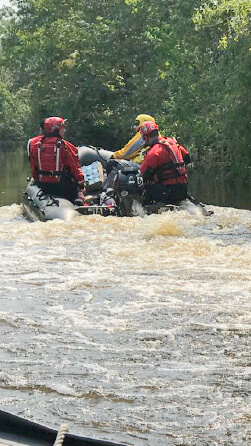CVFRS deploys to Texas with Vermont Urban Search & Rescue Task Force 1

On the afternoon of Aug. 31, 2017, a Swiftwater Rescue component of the Vermont Urban Search and Rescue Task Force 1 was deployed to Texas to assist with Hurricane Harvey.
The 16 deployed members are from various agencies throughout the State of Vermont, including Burlington Fire Department, Charlotte Fire & Rescue, Colchester Technical Rescue, Lyndonville Fire Department, City of Rutland Fire Department, Vermont Fire Prevention Division and the Williston Fire Department. The team left the Colchester Technical Rescue building on Thursday afternoon and drove straight through for 35 hours, arriving in College Station on Saturday morning at approximately 2:00 a.m. The trip was longer than normal due to roads being closed from the massive flooding. This is also the first out-of-state deployment for the team.
The team was staged in College Station awaiting assignment. During this time the crews readied their equipment and trained with crews from Greensboro and Charlotte, North Carolina. From College Station they were re-deployed to Orange County, Texas, to assist with efforts in that area.
It was during this drive to Orange County that the reality of this event really hit home. While driving there, we had to take some detours due to still-flooded roads, in some cases driving through 8–10 inches of water flowing over the roads and seeing people’s belongings and abandoned vehicles beside the road. When we arrived in Orange County, we were placed in a rotation waiting for assignment. Those assignments came and we went to work.
We were sent to different areas, areas that were believed not to have had a primary search yet completed. We were teamed up with the Texas National Guard, members of the Toledo Fire Department Swiftwater Task Force and Texas Law Enforcement agencies. We were sent to several neighborhoods to check in with the occupants and see if they were all right and if they needed anything; most of these residences had to be reached by boat or by walking. We were transported to these areas by the Texas National Guard members in their high-water vehicles; when the water got too high, the team would jump out, prepare and launch the boats.
The residents we made contact with were very gracious and appreciative of all the help that was offered. At one point, the team assisted in an emergency shelter that was set up in one community, serving food, moving and helping to organize supplies.
Overall it was a very successful deployment. A lot was learned by all members that will benefit us in the future.

